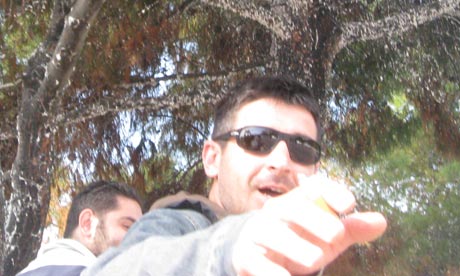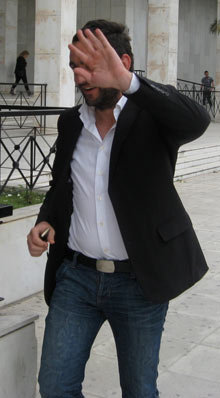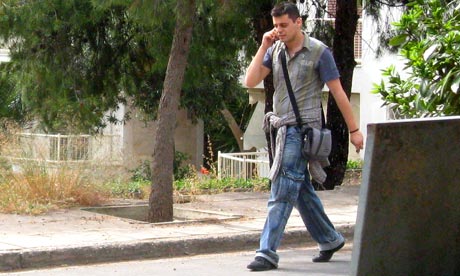In national elections, various arguments can be made for why voting is a good idea. If people like you vote then it is more likely that the kind of things you want will be implemented by government. Also, the mere fact that politicians have to face the electorate makes them less likely to corruptly line their pockets or behave in a lazily incompetent manner. So goes the theory, anyway.
With European Parliament elections, it is a bit less obvious what you are voting for. For most people, the European institutions are a bit vague, and it is not entirely clear where the European Parliament fits into it all. The really big European decisions are made by those big summits where Europe's leaders get together to talk about important things. The more day-to-day big decisions are made by the Council of Ministers (the ministers of member states with responsibility for the policy area) and the Commission (the body that heads the EU's permanent secretariat). As a permanent body, the Commission has more influence than its strict constitutional status would suggest, and it functions almost as the EU's government.
In national politics, elections decide who constitutes the government, but this is only kind of true in the EU (at least with regards to the European Parliament elections). The EU is not a parliamentary democracy, and the Commission is only semi-responsible to the European Parliament. It is the member states' governments who nominate the commissioners, though the European Parliament has to approve the incoming Commission and may thereafter remove it. The European Parliament has flexed its muscles in this area over the last number of years, forcing the resignation of one Commission over a corruption scandal and threatening to block the accession of another unless Italy withdrew the candidacy of an ultra-conservative right-winger.
The European Parliament does have a certain role in making EU policy. To be honest, I am a bit vague on the details, but my impression is that very much it rubber stamps the decisions taken elsewhere, only occasionally making real changes to them. Jamie Smyth in
The Irish Times mentions one such case, where the EU Parliament forced through a change in a Commission proposal so that people could not be employed under one country's terms and conditions while working in another*.
Even so, given that it actually does stuff, the European Parliament faces a fundamental problem that seriously undermines its credibility as a democratic institution – namely, that no one votes for it. And when people do vote for it, they typically vote as a way of signaling their support or opposition to domestic governments, not because they reckon the people they are voting for will keep an eye on the Commission or block repugnant EU policies. |n Ireland, there is the added element of European Parliament elections becoming personality driven games, kind of like a celebrity TV version of politics. Low turn-outs make it harder for the European Parliament to challenge decisions by the Council of Ministers or the intergovernmental summits. The latter groups have come to office thanks to national elections with generally higher turnout, giving them more legitimacy than the European Parliament.
I am not sure what the way round this is. European Parliament election turn-outs have been in permanent decline, something unaffected by any flexing of muscles by European parliamentarians. At the same time, one of the things people who like moaning about the EU say is that it is undemocratic. Maybe these people vote disproportionately in the elections for the one directly elected part of the EU decision-making apparatus, but I kind of doubt it.
Links:
Viewpoint: A truly European vote? (Simon Hix of the LSE gamely claims that the EU is an important body and suggests that
STV or
open list PR system would make people more engaged with the European Parliament; he then rather fancifully claims that Irish voters are very engaged with European issues and the workings of the European Parliament)
Parliament can no longer be seen as MEP 'Eurodisney' (Jamie Smyth in
The Irish Times talks about what the European Parliament does and advances several instances where it made a difference to the EU's direction and/or policies)
*Charlie McCreevy, Ireland's commissioner, who proposed this rule. One of the arguments advanced by Irish euro-sceptics during the Lisbon referendum campaign was that Ireland needed to have a commissioner. Left euro-sceptics also complained about the neo-liberal direction of some EU policies. I have never really understood why they felt it was so important to have McCreevy in the Commission, unless it was a way of keeping him out of domestic politics.
 The Bilderberg Group met last weekend. This lot take their name after the hotel where they first met. As anyone who has read books like Jon Ronson's Them will know, the Bilderbergers are seen by some as the secret rulers of the world. Certainly they seem to include some very influential world figures, and they seem also to be surprisingly secretive. There was no live blogging or Twitter feed coming from Bilderberg attendees. The likelihood
The Bilderberg Group met last weekend. This lot take their name after the hotel where they first met. As anyone who has read books like Jon Ronson's Them will know, the Bilderbergers are seen by some as the secret rulers of the world. Certainly they seem to include some very influential world figures, and they seem also to be surprisingly secretive. There was no live blogging or Twitter feed coming from Bilderberg attendees. The likelihood  is that no public figure will admit to having attended the Bilderberg meeting.
is that no public figure will admit to having attended the Bilderberg meeting. 
